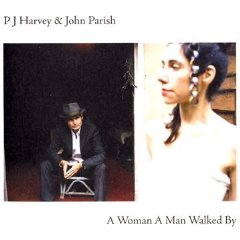PJ Harvey has often said she never wants to repeat herself. As her catalogue bears out, she always changes direction for each new project. Although it’s inevitable that an artist will in some ways repeat herself, she does an admirable job of sticking to her goal.
 For instance, her most accessible album, Stories From The City, Stories From The Sea (2000), which although sounded in some ways commercial for Harvey was really anything but when compared to Top 40 fare, was followed by a return to rawness and simplicity in Uh Huh Her (2004), reminiscent of some of her earliest work. Next came White Chalk (2007), completely piano-based, a first for her.
For instance, her most accessible album, Stories From The City, Stories From The Sea (2000), which although sounded in some ways commercial for Harvey was really anything but when compared to Top 40 fare, was followed by a return to rawness and simplicity in Uh Huh Her (2004), reminiscent of some of her earliest work. Next came White Chalk (2007), completely piano-based, a first for her.
Of course the common vein running through these, as with all her work, is the distinctive, accomplished voice, pure at times or rough-edged and manipulated through electronics at others, a compelling sense of melody that is rooted in her knowledge and appreciation for the roots of modern day rock and the thought-provoking vivid imagery of her lyrics that are never conventional.
A Woman A Man Walked By is Harvey’s second collaboration with John Parish, the first Dance Hall At Louse Point from 1996. They have worked together for a long time, since Harvey’s early days with Automatic Dlamini when she played saxophone for that band and on her solo work, particularly To Bring You My Love (1995), during which Parish played in her touring band. For both of their albums, Parish writes and plays the music and Harvey writes the words. Although I’ve often wondered how much input she must have with melody. I would think some at least.
Both albums don’t necessarily fall into the accessible category. The music is challenging but rewarding. You might not like each individual cut on these albums, but there are gems within and the overall effect is realization of an artistic vision worth viewing.
The opening track, Black-Hearted Love, is perhaps the most accessible (there’s that word again) on the album and one that sounds like it could be part of a Harvey solo effort. Although the guitar and musical backing is distinctly Parish, with driving, rocking chord-based riffs. They work so well together on this track with Harvey’s voice doubling the opening bar of each verse with Parish’s guitar, then sailing through one of the best melodies of the entire outing.
The album holds dark themes with lyrics that seem to indicate loss, certainly not uncharted territory for Harvey. Both Sixteen, Fifteen, Fourteen and Leaving California sound like takes on Americana roots music blended with English traditional. The instrumentation sounds almost Appalachian at times and the story line of Sixteen indicates a hide-and-seek that ends with tragic consequences. California yearns for the coolness and shade of England and bids farewell to the sunshine state. Is it a farewell to a place or something more personal?
The gorgeous melody of The Chair, which reminds one of water, darkness and loss, themes Harvey touched on in Down By The Water, among others, is followed by April, an ode to the time of year? It’s delivered in Harvey’s small, squeezed, child-like voice against a backdrop of churchy organ, provided by longtime collaborator Eric Drew Feldman. The vocal opens up into a full-bodied delivery near the close that Feldman dominates with his all encompassing keyboard.
The title cut combined with The Crow Knows Where All The Little Children Go is the kind of track Harvey fans love, an edgy, angst-ridden, sometimes spoken, sometimes sung attack that is profanity-laced and somehow frightening and humorous at the same time. The Crow is an unusual and interesting instrumental ride out of the main song section.
The Soldier contrasts A Woman with a small, spare arrangement of voice, guitar and piano, lamenting the plight of guilt and war-inflicted damage, while the driving Pig Will Not is the hardest rocker with a trademark Harvey vocal of shouted word over soaring melody and a dog-wolfing narrative of demanding negative affirmation: I will not!
The beautifully lilting melody of Passionless, Pointless gives way to the finale Cracks In The Canvas, which with its narrative and sung melody over the top reminds one of Harvey’s Is This Desire? and her treatment of the Peggy Lee classic Is That All There Is?
Except for a couple of contributions from Carla Azar on drums, Giovanni Ferrario, guitar, and the aforementioned Feldman, Parish provides all the instrumentation, creating quite a unique and effective sound collage of guitar, drums and keyboards, among other instruments, in well-conceived and executed arrangements.
A Woman is not an album the listener will tire of quickly like so many pop confections. It gives something new on each listen, having legs that outdistance most of what is available today in new releases. It’s encouraging yet somewhat surprising that the album cracked the Top 100 (80) in its first release week. Credit Harvey fans for this. I’ve been one since the early 1990s and have loved the journey she has provided for her followers. This is another interesting stop along the way.